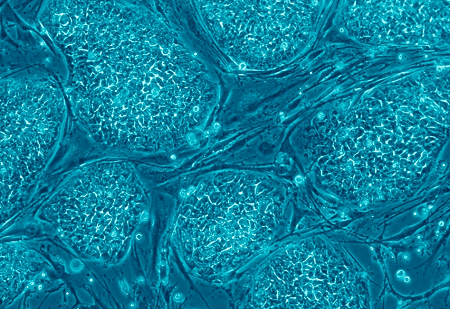New Method for Culturing Stem Cells Brings Technology Closer to the Clinic

In the last decade, induced pluripotent stem cells (iPSCs) have rapidly emerged as potential therapies for incurable diseases. Ensuring that iPSCs can be produced without inducing new mutations and free from animal-derived products will be essential for protecting patients who receive such therapies from developing cancer, acquiring animal-derived diseases, or having an autoimmune response against the therapy. Previously, researchers found a way to produce iPSCs using proteins rather than genetic material to avoid permanent changes to the DNA. A way to grow these specific types of stem cells without animal products was unavailable. However, researchers from Dr. Huey-Ching Wang’s group at the U.S. Army Institute of Surgical Research reported on a human protein called vitronectin, which makes up part of the matrix that cells move on, is capable of allowing iPSCs to grow and remain as stem cells in long-term cultures without animal product contamination. They made the vitronectin from bacteria and showed that iPSCs cultured on it are still able to produce all three lineages of early embryonic development in a dish, which effectively proves that these iPSCs are true stem cells. Development of such animal-free techniques for stem cell technology not only improves the safety profile of stem cell therapies but also ensuring stem cell research results are more relevant to humans.
References
- Kaini RR, Shen-Gunther J, Cleland JM, Greene WA, Wang HC. Tissue engineering part c: methods. 2016; 22:85-90. doi:10.1089/ten.tec.2015.0180. http://online.liebertpub.com/doi/abs/10.1089/ten.TEC.2015.0180?url_ver=Z39.88-2003&rfr_id=ori%3Arid%3Acrossref.org&rfr_dat=cr_pub%3Dpubmed&. Accessed March 11, 2016.








